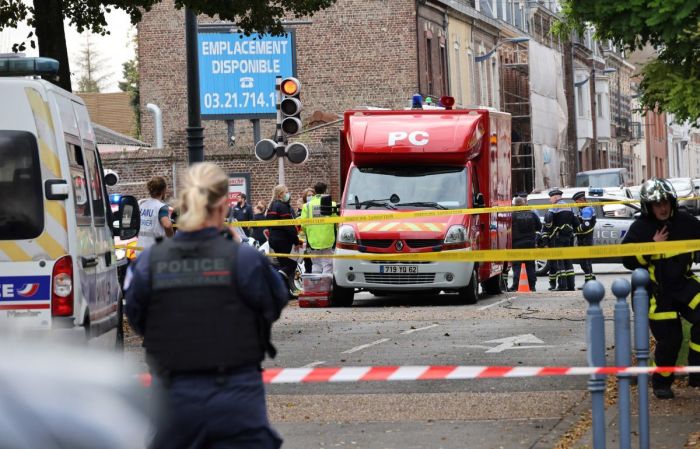
A growing number of attacks targeting churches and clergy across France have raised concerns over what some advocates are calling a surge in “Christianophobia,” as incidents reported in recent weeks include physical assaults, threats of arson and desecration of churches.
On one of the most recent occasions, Fr. Laurent Milan was confronted by a group of about 10 young men at the Notre-Dame-de-Bon-Repos church in Montfavet, near Avignon, shortly after celebrating evening mass on May 10.
The youths, some hooded and believed to be between 15 and 20 years old, initially asked to enter the church under the pretense of wanting to convert or visit, according to the French daily newspaper La Provence.
Once inside, the priest claimed they shouted insults directed at Christianity and yelled “Allahu Akbar” before warning him that they would return to burn down the church.
The priest later filed a police complaint, and authorities were deployed the following day to secure Sunday mass.
Three days earlier, another group had disrupted a parish meeting in the same location by shouting and banging on windows. Fr. Milan told the newspaper that the abuse was not personal but directed at the Catholic faith.
The incident in Montfavet followed a string of acts of desecration nationwide.
In Saint-Aygulf, southern France, a church was broken into on the night of May 4–5, The Catholic Herald reported. The tabernacle was ripped open, and the Eucharist was removed. Monseigneur François Touvet described it as a deliberate attempt to desecrate what Catholics hold most sacred.
Other recent attacks include the vandalism of the parish hall of Saint-Laurent in Maurepas, south of Paris, and a similar incident in Rennes at the church of Saint Jean Marie Vianney.
In Normandy, another parish hall was targeted. In Paris, a man carrying a knife entered the Saint-Ambroise church just before mass. Police responded quickly, and no one was harmed.
In a separate incident, a 96-year-old priest in Cambrai was kidnapped, tied to a chair, beaten and robbed by two burglars in March. The suspects remain at large. The stolen items included checkbooks, a chalice and a painting.
Two priests were attacked on Good Friday, April 18, reports the French weekly Valeurs actuelles. In Lisieux, Normandy, a man returned to the church twice in one day and grabbed the priest by the collar while threatening him. In Tarascon, Provence, another priest was slapped after asking a man to behave respectfully inside the church.
The incidents were reported mainly in local and conservative publications and received little to no attention in the mainstream national press, the European Conservative notes.
The Minister of the Interior, Bruno Retailleau, who also oversees religious affairs, did not issue any public statement in response to the attacks.
According to Got Questions, “Christianophobia” refers not to a literal fear of Christians but to hatred or hostility toward them and their beliefs. It involves despising Christians or what they represent, often manifesting as ridicule, marginalization or discrimination — particularly in secular or anti-religious contexts. The term is used to describe growing intolerance toward Christian values, especially when those values conflict with dominant social or political views.
Following the Montfavet incident, Archbishop François Fonlupt of Avignon attributed the attack in part to the poverty of the area. He warned against media coverage that could stoke tensions.
Critics have argued that poverty does not justify such acts.
In a separate event last month, a Muslim man was fatally stabbed at a mosque near Nîmes. The attacker, identified as a 20-year-old of Bosnian origin, filmed the murder while insulting Allah. In response, President Emmanuel Macron stated that “Racism and hatred based on religion can have no place in France. Freedom of worship cannot be violated.”
Concerns about immigration have also surfaced alongside the rise in religious tensions. Most recent arrivals in France have come from North and Sub-Saharan Africa, and under Macron, both legal and illegal immigration have reached record highs.
Figures from a recent intelligence report indicated that 31% of religiously motivated offenses in France in 2024 were classified as anti-Christian. The report said antisemitic acts accounted for 62%, while anti-Muslim incidents made up 7%.
The number of arson attacks on Christian places of worship rose from 38 in 2023 to 50 in 2024 — a 30% increase. While some of the incidents occurred in New Caledonia, a French overseas territory that experienced unrest earlier in the year, the majority were in mainland France.
In March 2024, in the village of Clermont d’Excideuil in southwest France, vandals defaced 58 graves, a church door and a World War I memorial overnight. Islamist slogans were spray-painted in French and Arabic, including phrases like “Submit yourselves to Allah,” “Happy Ramadan non-Muslims” and “France is already Allah’s.” The word “Koufars,” meaning “unbelievers,” was also written across the cemetery, and “Ramadan Mubarak” was painted on the nearby church’s doors.
In 2012, three Jewish children and a teacher were shot in Toulouse, and in 2016, Fr. Jacques Hamel was murdered by Islamic State sympathizers. In 2020, three people were killed by a Tunisian migrant outside a church in Nice.
Last November, the watchdog group OIDAC Europe warned that anti-Christian hate crimes in Europe reached a total of 2,444 incidents in 2023, with around 1,000 happening in France. The majority of these attacks — about 90% — were aimed at churches and cemeteries. French officials documented 84 personal attacks on individuals in 2023.


















